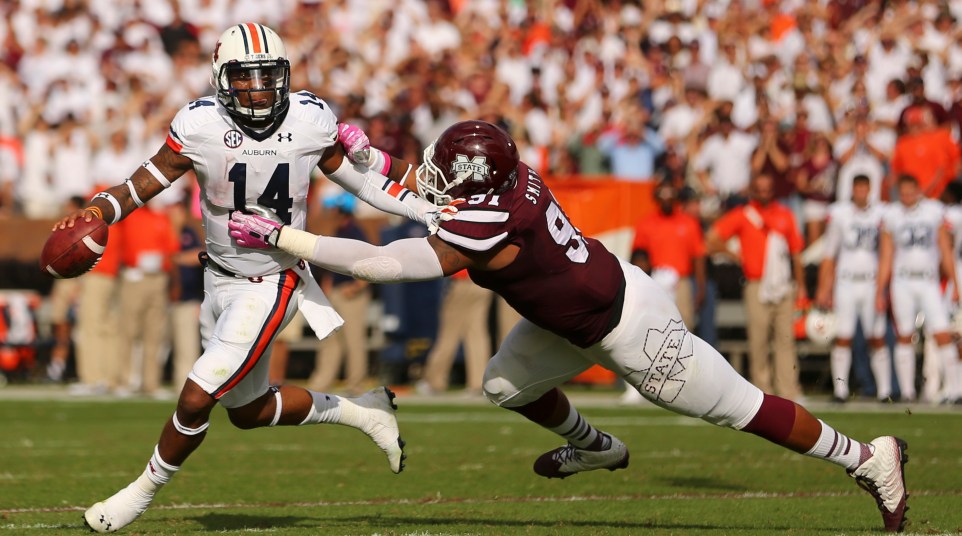Discipline vital for Mississippi State to slow Georgia Tech's triple-option
The varying offenses of the SEC presented the Mississippi State defense with a number of different looks in 2014. One style of offense the Bulldogs never saw, however, was the triple-option attack.
They’ll get their first taste of the run-heavy option offense on Dec. 31 in their Orange Bowl showdown with Georgia Tech, one of the most successful triple-option teams in the FBS.
MSU is lucky to have an extended period of time from the end of the regular season to the bowl game to learn how to defend the triple-option, but ultimately the success of its defense will be determined by one principle: discipline.
At risk of over-simplifying this matchup, if Mississippi State remains disciplined on defense, it should have no trouble winning this game. If it loses its discipline, however, it will be torched by a ball-control rushing attack looking to slow the game down to a grind.
The Yellow Jackets will have plenty of moving pieces pre-snap and plenty of misdirection once the ball is in play, making it imperative that each and every Mississippi State defender focus on his own role rather than trying to follow the ball.
Defenses that bite on play-fakes and men in motion often find themselves out of position on a given play. After all, those fakes are meant to lead defenders away from the ball.
If Mississippi State’s defenders all play their specific roles, it will be much tougher for Georgia Tech to find a gap in the defense.
First and foremost, MSU’s defensive line must maintain proper gap discipline in trying to stifle plays at the line of scrimmage.
Defensive tackle Chris Jones is among the most powerful defenders in the SEC, and he must occupy multiple blockers and get a push up the middle in order to collapse a play from the inside. The less success Georgia Tech has on inside gives to its fullbacks, the easier it will be for the Bulldogs to defend Tech’s option runners on the edges.
Speaking of the edges, defensive ends Preston Smith and Kaleb Eulls will be critical in slowing down the Yellow Jackets’ option plays on the outside.
Smith recorded a tackle for loss in 11 straight games, but defending the triple option is less about getting into the backfield from the defensive end position and more about playing along the line of scrimmage to keep Tech from getting outside.
If Smith is sucked into the backfield but an option pitch gets past him to the edge, there won’t be anyone there but a defensive back to make an open-field tackle. But if Smith follows the option runners all the way down the line of scrimmage, they’ll eventually have to run toward him, setting him up for an easy tackle.
The same can be said for Eulls, a Senior Bowl invitee playing on the other side of the line.
The second level of the defense — the linebackers — are the ones able to play more freely and aim to make plays in the backfield. Still, those linebackers cannot over pursue a ball-carrier just to save 1-2 yards on a given play. Ultimately, slowing the triple-option comes down to limiting the number of runs of four-or-more yards, and linebackers must ensure they don’t run themselves out of a play to keep big plays from happening.
Middle linebacker Benardrick McKinney is among the best at his position in the entire country, and he’ll ensure that no fullback gets past him up the middle if that fullback does manage to break through the line of scrimmage.
Outside backers Beniquez Brown and Richie Brown (no relation) must do what they can to keep themselves unblocked for as long as possible, keeping themselves free to follow a runner anywhere on their side of the field. Again, it is about remaining in position, not making plays in the backfield, but if a backer is completely unblocked an aggressive pursuit of a ball-carrier could put Georgia Tech in a difficult spot behind the chains.
In the secondary, the name of the game is sound tackling, which stems from great discipline. If a ball-carrier reaches the secondary on a given play, Georgia Tech has already won the play. However, be it safeties up the middle or corners on the outside, the secondary must make tackles to keep a big play from becoming a scoring play.
Furthermore, the secondary must remain disciplined as a unit in pass coverage, even though Tech only threw the ball an average of 14 times per game this season. The Bulldogs were vulnerable in coverage over the top down the field, and Georgia Tech is capable of burning unsuspecting secondaries with its play-action passing attack if they lose discipline in the back-end of the defense.
Tech’s unorthodox offense gives most opposing defenses fits by slowing the game down and involving play-fakes on every snap. But the defenses that don’t concern themselves with the fakes and the men in motion, and instead fills its roles on a given play, are the defenses that ultimately give Tech the most trouble.
Mississippi State has the talent, especially in the front seven, to stop the triple-option. We’ll learn on New Year’s Eve if it has the discipline to do so.

